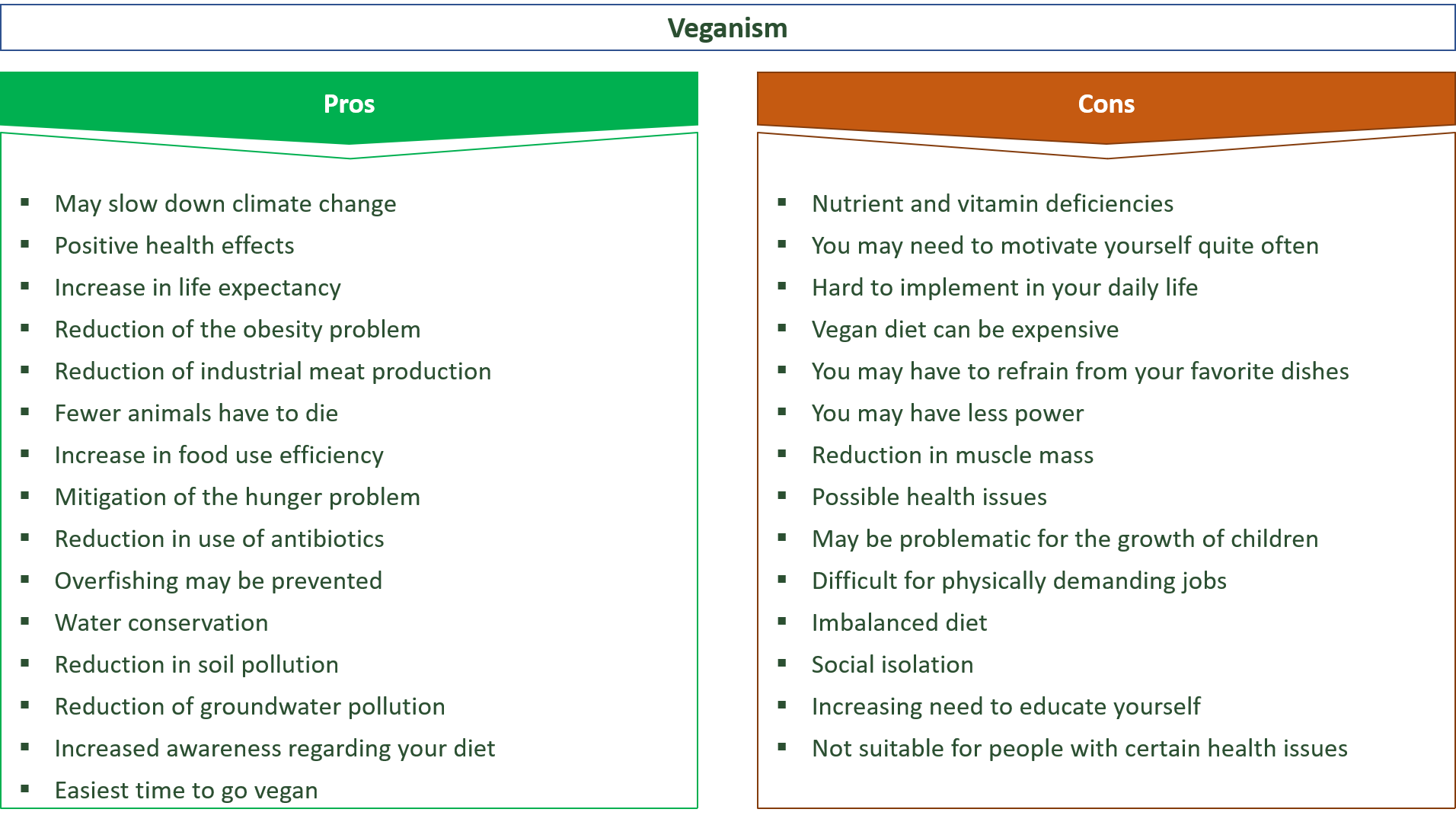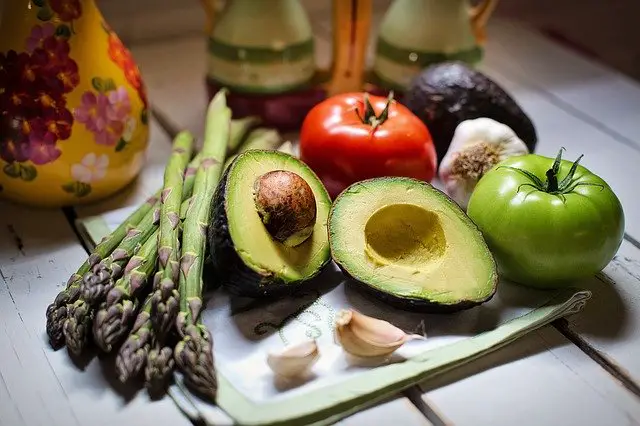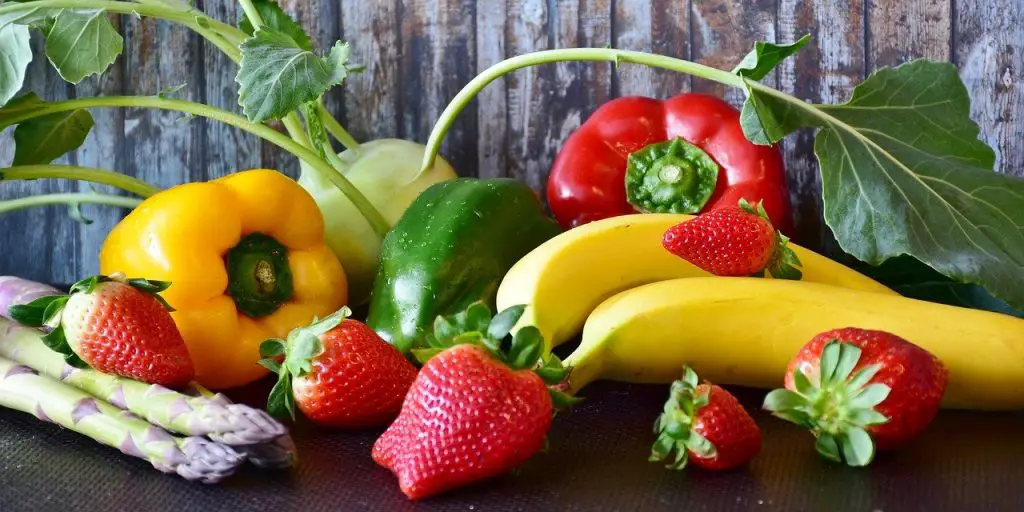“I try to only eat animals that are vegan. I’m probably the opposite of a vegan.”
Jim Gaffigan, Comedian
Advantages & Disadvantages of Veganism

Veganism and the related vegan diet have become quite popular over the past decades.
People become more aware of their health and many of us also want to avoid supporting the factory farming industry.
Thus, going vegan is a great way to save our animals, to increase our health levels and to slow down global warming at the same time.
Even though there are many additional benefits from going vegan, there are also some problems related to it.
In this article, the pros and cons of vegan diets are examined.
Audio Lesson
Contents
Advantages of a Vegan Diet
- May slow down climate change
- Positive health effects
- Increase in life expectancy
- Reduction of the obesity problem
- Reduction of industrial meat production
- Fewer animals have to die
- Increase in food use efficiency
- Mitigation of the hunger problem
- Reduction in use of antibiotics
- Overfishing may be prevented
- Water conservation
- Reduction in soil pollution
- Reduction of groundwater pollution
- Increased awareness regarding your diet
- Easiest time to go vegan
May slow down climate change
One important advantage of veganism is that it can slow down climate change to a certain extent.
The production of meat implies high levels of greenhouse gas emissions, which in turn contribute to global warming.
Thus, by avoiding meat consumption and switching to a vegan diet instead, you can improve your ecological footprint and mitigate the global warming issue.
Positive health effects
Meat consumption is also associated with a variety of different health problems.
Especially in our Western world where we consume excessive amounts of meat on a regular basis, the risk for heart conditions and cancer is much higher compared to regions where less meat is consumed.
By refraining from excessive meat consumption and relying on a vegetable and fruit diet instead, you may be able to improve your health level significantly.
However, make sure that you inform yourself before you engage in a vegan diet since there are also some health risks implied by vegan diets if you apply them in an improper manner.
Increase in life expectancy
Some studies also claim that people who engage in vegan diets also have a higher life expectancy.
However, it is hard to figure out whether this is actually true or not.
For instance, people who go vegan might live longer on average.
Yet, this may not be due to their diet but rather since they are more likely to exercise and to take care of their body.
Hence, many factors contribute to our life expectancy and it is hard to prove that veganism will actually help to increase our life expectancy since there are many other factors playing a role as well.
Reduction of the obesity problem
Veganism can also reduce the obesity problem.
Especially in our rich Western world, obesity has become a big problem and many millions of people die every year due to the health issues related to obesity.
Going vegan could mitigate this issue since people who engage in vegan diets often consume fewer calories over the long run and are likely to lose weight.
Thus, especially in countries that suffer from high levels of obesity, vegan diets may be a great way to reduce the overweight problem and the adverse health effects related to it.
Moreover, also the state will benefit from a reduction of obesity since the medical treatment costs related to obesity are enormous and with a reduction in the overweight problem, the government could save plenty of money and spend it on other projects instead.
Reduction of industrial meat production
Another upside of the vegan diet is that it reduces the need for factory farming. In our current state of the world, we consume excessive amounts of meat.
Those amounts of meat can only be produced with the help of industrial meat production.
However, in those meat production processes, the animals are treated quite poorly.
By refraining from meat consumption and switching to a vegan diet instead, we could significantly reduce the need for factory farming since the overall global demand for meat could be reduced.
Fewer animals have to die
Opponents of meat consumption also often claim that it is quite unethical to consume animals nowadays since there are several other food options out there and that we as humanity should progress to a more eco-friendly and animal-friendly diet.
One approach towards a more sustainable and animal-friendly diet is to go vegan since by practicing veganism, there will be no need to consume animals and fewer animals have to die due to that on a global scale.
Increase in food use efficiency
Veganism can also be considered to be more efficient than meat consumption in the context of how many people we will be able to feed on our planet.
Since the production of one calory of meat requires the use of multiple calories of plant materials, meat consumption can be considered to be quite inefficient.
Thus, if more people switch to a vegan diet, we could feed a higher number of people on a global scale.
Using our calories in an efficient manner may become pretty important in the future since our world population is growing and there are already many conflicts regarding food supply which may even become worse.
Mitigation of the hunger problem
Global hunger is another issue that can be connected to excessive meat consumption.
While some people, especially in our rich Western world, consume excessive amounts of meat, millions or even billions of people in poor countries suffer from hunger and starvation.
This is partly due to the fact that a significant fraction of meat will be exported from poor countries and the local population might suffer from a lack of meat and other food.
Thus, by going vegan, we could also reduce the global hunger problem to a certain extent.
Reduction in use of antibiotics
Most of our meat is produced with the help of factory farming.
Large numbers of animals are raised on a confined space and to avoid the spread of diseases in those big farms, large amounts of antibiotics are used.
However, this excessive use of antibiotics is a great danger to humanity since it can lead to antibiotic resistance.
Imagine you get sick and need antibiotics for medical treatment. If those antibiotics no longer work due to resistance issues, you might be in serious trouble.
Thus, if the problem of antibiotic resistance becomes worse over time, chances are that millions of people around the world will die from its consequences.
One solution in order to mitigate this problem would be to avoid meat consumption and to switch to a vegan diet instead.
By doing so, you would no longer have to rely on the meat of factory farms and you may be less likely to become antibiotic-resistant.
Overfishing may be prevented
There is not only a problem related to our excessive meat consumption, also our global fish stocks decrease at an alarming rate.
If we continue to engage in overfishing, chances are that we might run out of fishes sooner or later.
Therefore, in order to fight the problem of overfishing, switching to a vegan diet would be a great tool since consuming fish is not allowed in veganism.
Water conservation
Another problem related to conventional diets is that they often imply serious water consumption.
For instance, in the meat production process, plenty of water is used.
Water is a quite important resource and will even become much scarcer and more valuable in the future due to global warming.
Thus, it will become increasingly important to conserve water in all areas of our lives.
By going vegan, you can contribute your part and save plenty of water that would have to be used in meat production.
Reduction in soil pollution
Our meat-based diet also implies serious soil pollution since for the production of animal feed, large amounts of chemical fertilizers have to be used.
However, the use of those fertilizers also implies the pollution of the soil.
In the long run, the soil may lose its fertility and agricultural processes may no longer be possible.
In order to avoid the soil pollution issue, switching from a meat-based to a vegan diet would make great sense.
Reduction of groundwater pollution
Soil pollution also often implies the contamination of our groundwater.
Sooner or later, harmful substances that are contained in our soil will be washed into the groundwater, which may lead to serious issues for the local population, especially in regions where people are heavily dependent on clean groundwater for cooking and other parts of their daily life.
Since soil pollution and the related groundwater pollution are often connected to excessive factory farming, switching to a vegan diet may be a valid tool to improve our groundwater quality.
Increased awareness regarding your diet
Going vegan will also likely increase your education and your awareness regarding your diet and what’s good for you and what’s not.
By learning about proper nutrition, you may be able to increase your health level, which may give you all kinds of advantages in your life and will also likely increase your life expectancy.
Easiest time to go vegan
In our current technological state, it is also rather easy to go vegan compared to centuries ago.
Through the internet, you can get plenty of delicious recipes and also some tips on how to avoid mistakes related to veganism.
Consequently, many people claim that it is the easiest time to go vegan now since the barriers to entry are extremely low due to our sophisticated information flows.

Disadvantages of Veganism
- Nutrient and vitamin deficiencies
- You may need to motivate yourself quite often
- Hard to implement in your daily life
- Vegan diet can be expensive
- You may have to refrain from your favorite dishes
- You may have less power
- Reduction in muscle mass
- Possible health issues
- May be problematic for the growth of children
- Difficult for physically demanding jobs
- Imbalanced diet
- Social isolation
- Increasing need to educate yourself
- Not suitable for people with certain health issues
Nutrient and vitamin deficiencies
As we have seen, there are many advantages related to veganism.
However, going vegan also implies some problems.
For instance, vegans often suffer from nutrient and vitamin deficiencies since many components that are contained in meat are hard to get out of plants and vegetables in a sufficient amount.
Therefore, many vegans use dietary supplements in order to ensure the supply with certain vitamins and minerals.
Thus, before you go vegan, make sure to inform yourself about what you have to take into account to stay healthy.
You may need to motivate yourself quite often
It may also be quite hard to stay strong and refrain from meat consumption.
Since you will be confronted with delicious meat dishes all the time, chances are that you may fall for it sooner or later.
Hence, in order to stay vegan, you have to have a pretty strong will, especially if you are a meat lover.
Hard to implement in your daily life
In some regions of our planet, it may also be quite difficult to implement a vegan lifestyle in your daily life.
Especially in regions where veganism is not popular yet, you might have a hard time finding supermarkets or restaurants that are specialized in vegan products.
Thus, you might have to make great efforts in some regions in order to live your vegan lifestyle and it might also be quite time-consuming to get all the groceries you need.
Vegan diet can be expensive
Even though many people think that going vegan might save you money, the opposite may be true in many cases.
Vegan food is often quite costly compared to the consumption of cheap meat.
Therefore, especially if you are rather new to the vegan lifestyle and don’t know where to buy vegan food in a cheap manner yet, chances are that you might have to spend more money on food compared to your previous meat-based diet.
You may have to refrain from your favorite dishes
Especially if you love a good steak or a juicy burger, it will be quite hard for you to give up your meat-based diet and to switch to veganism.
Many people love cooking and eating delicious meals made out of meat.
This is even more true for men.
Most men could not imagine to go vegan and to refrain from meat at all.
Thus, depending on how much you like eating meat, it may be hard to impossible to go vegan for you since you might simply not be willing to give up your favorite meals.
You may have less power
Since veganism is based on the consumption of fruits and vegetables, the absence of meat in the diet may lead to less physical or also mental power.
This is especially true if you don’t use food supplements to get certain vitamins or minerals that could not be delivered through vegan diets in a sufficient manner.
Thus, in case you engage in veganism without sufficient knowledge about what you are doing, chances are that you will feel quite exhausted in the long run.
Reduction in muscle mass
Since proteins are essential to build and sustain muscle mass, chances are that switching from meat to a vegan diet will also have a negative effect on your muscles.
It is not by chance that bodybuilders often eat excessive amounts of meat in order to build muscle mass.
Thus, especially if you are in the bodybuilding business or in other industries that require plenty of muscle mass and physical strength, veganism might not be the right way to go for you.
Possible health issues
Even though going vegan can be quite healthy for your body and your brain if done properly, you may also suffer from serious health issues if you don’t know what you are doing.
For instance, you might suffer from severe nutrient deficiencies, which might translate into serious physical and also mental health problems.
Thus, in order to avoid those issues, make sure to inform yourself about what you have to take into account before switching to a vegan lifestyle.
May be problematic for the growth of children
Especially for children, it is crucial that they get a variety of nutrients and vitamins in order to grow and stay healthy.
Thus, even though veganism provides many advantages, it might not be the right way to go for children since it might cause severe nutrient deficiencies, which could significantly harm the health of your children.
Therefore, at least make sure to consult a doctor if you consider raising your children in a vegan manner in order to avoid any health complications.
Difficult for physically demanding jobs
If you work in construction or in any other job that involves plenty of physical work, chances are that you might have a harder time going vegan compared to people working in an office job.
This is due to the fact that meat is a great supplier of physical strength and by going vegan, you may lose part of this power.
Thus, you should take into account this fact if you consider going vegan in order to avoid any unpleasant consequences at work.
Imbalanced diet
Veganism is also often criticized and opponents often claim that it is a quite imbalanced diet form.
Many vitamins and nutrients are missing and the chances to suffer from nutrient deficiencies might be high.
Moreover, veganism is also often considered as kind of unnatural since our ancestors both relied on plants and meat as major food sources.
Thus, our body evolved with meat over millions of years and completely refraining from meat consumption might not be considered to be in line with nature at all.
Social isolation
In some regions, veganism might also not yet be socially accepted and people engaging in vegan diets might have a quite hard time since they might become socially isolated.
For instance, in regions where veganism is tabooed, you might have a quite hard time finding friends since people may be quite skeptic regarding your lifestyle.
Increasing need to educate yourself
Since veganism requires you to really learn about your nutrition and your diet, you might have to spend plenty of time in the beginning to figure out what you are allowed to eat, where to get the respective groceries from and so on.
Thus, it might be quite time-consuming to switch to a vegan diet and you should make sure that your motivation level is high enough to take those efforts in order not to quit at some point.
Not suitable for people with certain health issues
Some people might also not be able to join the vegan lifestyle since they may suffer from certain diseases that might prevent them from going vegan.
Thus, for those people, a certain conventional diet might be necessary in order to avoid any health complications.

Top 10 Veganism Pros & Cons – Summary List
| Veganism Pros | Veganism Cons |
|---|---|
| Mitigation of global warming | Nutrient deficiencies |
| Health benefits | Hard to execute in daily life |
| Increase in food efficiency | Possible adverse health effects |
| Water conservation | Vegan diets can be expensive |
| Prevention of overfishing | Social isolation issues |
| Less factory farming required | Problematic in physically exhausting jobs |
| We could feed more people on a global scale | Decrease in muscle mass |
| Reduction in antibiotics | Unnatural diet |
| Reduction of groundwater pollution | May hurt the development of children |
| Reduction of soil pollution | You might have less power |
Conclusion
Veganism has become quite popular over the past decade.
Going vegan has many important advantages, however, it also implies serious downsides.
It is on you to decide whether a vegan diet is the right way to go or not.
Before making this decision, make sure to check out all the pros and cons of veganism in order to make a profound decision since it could heavily influence your quality of life as well as your health.
Sources
https://en.wikipedia.org/wiki/Veganism
https://vegan.org/about-veganism/
https://www.ilovevegan.com/resources/the-basics-of-veganism/

About the author
My name is Andreas and my mission is to educate people of all ages about our environmental problems and how everyone can make a contribution to mitigate these issues.
As I went to university and got my Master’s degree in Economics, I did plenty of research in the field of Development Economics.
After finishing university, I traveled around the world. From this time on, I wanted to make a contribution to ensure a livable future for the next generations in every part of our beautiful planet.
Wanna make a contribution to save our environment? Share it!
